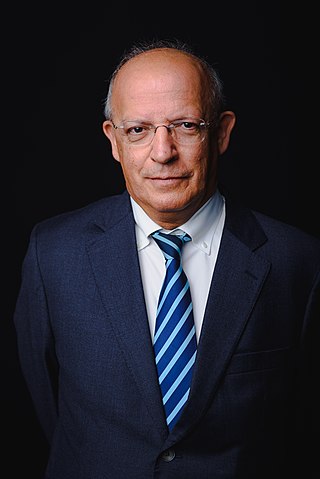Related Research Articles

José Bonifácio de Andrada e Silva was a Brazilian statesman, naturalist, mineralist, professor and poet, born in Santos, São Paulo, then part of the Portuguese Empire.

Alda Neves da Graça do Espírito Santo, known as Alda do Espírito Santo or Alda Graça, was a poet from São Tomé and Príncipe working in the Portuguese language. She also served in the Santomean government after the country's independence.

Joaquim Teófilo Fernandes Braga was a Portuguese writer, playwright, politician and the leader of the Republican Provisional Government after the overthrow of King Manuel II, as well as the second elected president of the First Portuguese Republic, after the resignation of President Manuel de Arriaga.
Hugo José Jorge O'Neill was the head of the Clanaboy O'Neill dynasty, whose family has been in Portugal since the 18th century.

Eduardo Lourenço de FariaGCSE, GCIH, best known as Eduardo Lourenço, was a Portuguese essayist, professor, critic, philosopher and writer.

Boaventura de Sousa Santos is a sociologist, Professor emeritus at the School of Economics at the University of Coimbra (FEUC), Distinguished Legal Scholar at the University of Wisconsin-Madison Law School, and Director Emeritus of the Centre for Social Studies (CES) at the University of Coimbra. A Marxist, outspoken sympathizer and avowed supporter of the Bloco de Esquerda party, he is regarded as one of the most prominent Portuguese living left-wing intellectuals. In 2023, after a sexual harassment scandal, the University of Coimbra suspended his academic positions until the events are investigated.

Santa Cruz is a former civil parish in the municipality of Coimbra, Portugal. In 2013, the parish merged into the new parish Coimbra. In 2001, its population was 6866 inhabitants, in an area of 5.56 km² that parallels the north (right) margin of the Mondego River, extending to the village of Adémia in Trouxemil.

Santa-Rita Pintor, born Guilherme Augusto Cau da Costa de Santa-Rita, was a Portuguese Futurist painter, known for his eccentricities, which included his signature mode of dressing: work clothes with striped rectangles.

Augusto Ernesto dos Santos Silva is a Portuguese sociologist, university professor, and politician who has been the President of the Assembly of the Republic since 2022, in the 15th Legislature. From November 2015 to March 2022, he was the Portuguese Minister of Foreign Affairs, in the XXI and XXII Constitutional Governments led by Prime Minister António Costa.

Moira Ivana Millán, is a Mapuche activist from Argentina. She is one of the leaders of the indigenous ancestral lands recovery movement. The recovery rights are recognized by the 1994 amendment of the Constitution of Argentina. She participates in the feminist movement Ni una menos, denouncing the feminicide of indigenous women, and promotes in the "Women's Encounters" the greater visibility of the problem of indigenous women.

Isabel de Magalhães Colaço was a Portuguese lawyer and university professor who was the first woman to obtain a doctorate of law in Portugal and the first woman to sit on the country’s Constitutional Court.

The Associação Feminina Portuguesa para a Paz was a female pacifist association created in 1935 and dissolved by the Esdado Novo dictatorship in 1952. It had active groups in Lisbon, Coimbra and Porto. Although declaring itself apolitical, many of its members were anti-fascists opposed to the Estado Novo. Its activities involved providing support to prisoners of war, and it organized lectures, exhibitions, and other events as a way to disseminate the principles of World Peace. In the last decade of its existence, it became increasingly opposed to the Government, in response to increased repression. The Association published an occasional Bulletin and had a children's choir, directed by Francine Benoît.

Maria da Graça Amado da Cunha (1919–2001) was a Portuguese classical pianist, best known for interpreting the works of the Portuguese composer Fernando Lopes-Graça. She was a feminist and an opponent of the right-wing Estado Novo regime that governed Portugal between 1933 and 1974.

Eduarda Lapa was a painter and painting teacher who specialized in naturalist painting, especially still life, becoming known as the "flower painter" and the "ambassador of colours". An active feminist, she was the first woman to join the board of the Portuguese National Society of Fine Arts.
Maria Lúcia Amaral is a Portuguese lawyer, university professor, politician and judge. She was vice-president of the Constitutional Court of Portugal and is Portugal's 10th Ombudsman, being the first woman to hold this post.

Graça MoraisGOIH is a Portuguese artist. A member of the Academia Nacional de Belas-Artes of Portugal, she was made a Grand Officer of the Order of Prince Henry in 1997. She is married to the musician Pedro Caldeira Cabral.
References
- ↑ "COLÓQUIO/Letras : Resultado de pesquisa". coloquio.gulbenkian.pt. Retrieved 2023-04-21.
- 1 2 Caldeira, Isabel; Capinha, Graça; Matos, Jacinta (2017). "The edge of one of many circles: homenagem a Irene Ramalho Santos Vol. I" (PDF). Imprensa da Universidade de Coimbra. Retrieved 18 May 2021.
{{cite web}}: CS1 maint: multiple names: authors list (link) - 1 2 3 4 Sociais, CES-Centro de Estudos. "Maria Irene Ramalho". CES - Centro de Estudos Sociais. Retrieved 18 May 2021.
- 1 2 Mendes, Martha. "Maria Irene Ramalho". University of Coimbra. Retrieved 19 May 2021.
- ↑ "Maria Irene Ramalho". ORCid. Retrieved 19 May 2021.
- ↑ Videira, Carolina (9 December 2019). "Maria Irene Ramalho encerra Ciclo de Conferências Internacionais na Guarda". beira.pt. Retrieved 18 May 2021.
- 1 2 Caldeira, Isabel; Matos, Jacinta; Capinha, Graça (April 2017). The Edge of One of many Circles: Homenagem a Irene Ramalho Santos (PDF). Coimbra: Coimbra University Press. ISBN 978-989-26-1307-9.
- ↑ "Quem tem medo dos estudos feministas?". Público. Retrieved 19 May 2021.
- ↑ Coimbra, Universidade de. "Rua Larga". Rua Larga (in Portuguese). Retrieved 2023-04-20.
- ↑ "(Maria) Irene Ramalho (de Sousa) Santos" (PDF). Brown University. Retrieved 19 May 2021.
- ↑ "Mary C. Turpie prize". American Studies Association. Retrieved 19 May 2021.
- ↑ DigitalRM (6 July 2018). "Maria Irene Ramalho distinguida pelo Ministério da Ciência". Campeão das Províncias. Retrieved 19 May 2021.